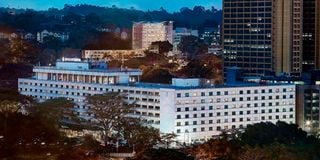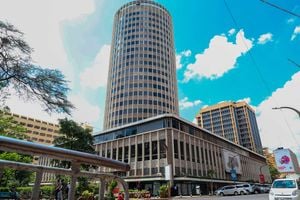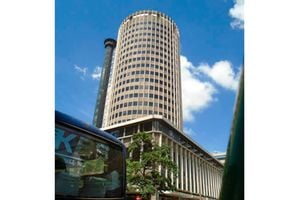
Hotel InterContinental Nairobi.
Full ownership of the prestigious Nairobi Intercontinental Hotel has been a long-held dream of allies of former president Daniel arap Moi.
But a miscalculation nearly five years ago has returned to haunt the Sovereign Group after the Treasury denied the Moi-linked investment group the right to buy State shares in the now shut down five-star hotel, four people familiar with the talks said.
The government, which owns 33.8 per cent of Nairobi Intercontinental Hotel, is offloading its stake in one of the landmarks of the capital city where Sovereign Group has a 53 per cent stake.
The State stake has been put on the market for any interested investor to snap, tearing a shareholder agreement that demanded the shares be offered to existing shareholders through pre-emptive rights.
The implication of the pre-emptive rights is that the shares being offloaded cannot be offered in the open market until existing shareholders such as Sovereign Group — the largest investor— have been given a chance to buy the stocks. The Treasury through the Privatisation Commission shocked the Sovereign Group by declaring that the pre-emptive rights expired and did not exist.
It reckoned that an earlier rejection of the shares by the Sovereign Group killed the pre-emptive clause in the shareholder agreement, irritating the Moi allies. The government has made several unsuccessful attempts to sell Intercontinental Hotel since 2011, and Sovereign Group was said to have lost interest in purchasing the 33.8 per cent stake when available at the peak of Covid-19 —which had ravaged Kenya’s tourism industry and made the deal unattractive.
The sale of government shares in InterContinental first hit a snag in 2015 after Sovereign Group placed bids that were below the set reserve price.
This time round, the investment fund, the sources say, believed the pre-emptive right was intact and would be triggered any other time the State sought to offload its shares.
“The controversial bit of this transaction is that the Sovereign Group does not have pre-emptive rights. Some years back the investment group said they were not interested. Now, they are interested, but the government has said the rights lapsed,” said a source working on the Intercontinental Hotel deal who asked not to be named as he is authorised to speak to the media.

The Intercontinental Hotel in Nairobi. Nation.
“They are uncomfortable with the State’s interpretation of the pre-emptive rights, but they have decided not to fight a government perceived to be hostile to Moi allies.”
The Moi family and a majority of their allies backed opposition leader Raila Odinga in the battle for presidency in the August 2022 poll that saw President William Ruto emerge victorious.
Sovereign Group is chaired by Joshua Kulei, a former powerful aide to the late President Daniel arap Moi and wealthy businessman with interests in media, education, mining, real estate, logistics and hospitality.
Some of the firms it jointly owns with the Moi family include Standard Group, Sunshine School and Siginon Group.
The State on March 31 gave investors up to April 18 to place bids for its 33.83 per cent stake in Intercontinental Hotel, exposing the Sovereign Group to bidding war in a facility that was earlier valued at Sh4.5 billion.
The lack of pre-emptive rights has offered the State leverage in pursuit of a premium for the sale of the hotel, which was shut down in August 2020 in the wake of coronavirus economic fallout, rather than direct negotiations with Sovereign Group for the stake. The State and Sovereign Group have had separate valuations for the stake.
Also Read: Save prime hotels from ‘vultures’
“The government earlier did not accept the Sovereign Group offer. It was slightly above what the government was looking for,” said one of the four sources.
With the hotel shut, the land where the 389-room facility sits is considered prime and a trophy asset by property investors.
The land is estimated at about 3.3 acres with a value of nearly Sh2.4 billion.
The hotel was already struggling before the Covid-19 pandemic outbreak and was in 2019 declared technically insolvent on failure to service its debts that stood at Sh717 million.
The debt was owed to Stanbic Bank.
The Intercontinental Hotels Corporation Group, which is listed in both the UK and USA, also ended its lease agreements with Kenya Hotel Properties Ltd (KHPL), the holding company for the five-star hotel.
The InterContinental Hotels Corporation had been running and managing the 389-room InterContinental Hotel Nairobi under a 99-year lease since April 1967. Sovereign Group has ambitions of fully owning the facility after reportedly snapping the 33.83 per cent stake that was initially owned by InterContinental Hotels Corporation.
This pushed its ownership to about 53.1 percent.
The investment fund has sought to add Intercontinental on its stable of hotels that includes Nakuru’s Merica hotel and Crater Lake Company, a luxury tented camp in Naivasha.
State-owned Development Bank of Kenya with a 12.99 per cent stake is the other significant shareholder in Kenya Hotel Properties, InterContinental Hotel Nairobi’s holding company.
Separately, Mr Kulei, former President Moi’s former private secretary Rodger Kacou and Ahmed Jibril own a combined stake of less than one percent in the firm.
Before the notice to sell the State’s 33.8 percent stake, Kenya Hotel Properties (KHP) was considering leasing out the building or converting it into a mixed-used property.









